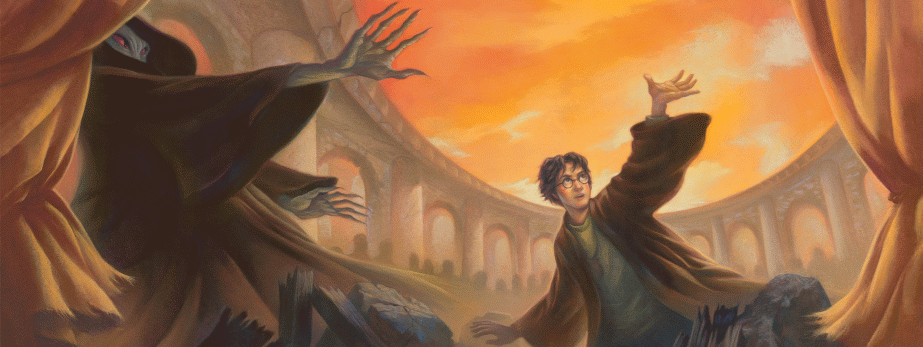 |
| Cover Art by Mary GrandPre |
Rereading Harry Potter and the Deathly Hallows with my students pre-movie was one of my favorite experiences as a teacher. Epic conversations came out of our meetings, which were a safe haven to bring out each members' inner nerd (I say that in the best of ways, children. I think the inner nerd is the best part of anyone.) as we discussed character arcs, endings, losses, loves. I have challenged each of the members of the book club to post an epic book response in the coming week about what moves their hearts the most in the series. Obviously, I cannot wait to read them and I'll write my own epic post as well. But to help them remember all the glory we discussed--and for it to get all the other Harry Potter fans I know thinking as they reread/watch the movie, I thought I'd post some of their brilliance/some windows into our discussions here. Do not read ahead if you have not finished the series, as our discussions looked at the entire series story arc.
One of my favorite comments presented in all of the book clubs was when a student said: "I love the passion of Ron, Harry and Hermione--and how they have a quest and something to believe in." I responded with the idea that I think that we can have that in our lives, though sadly without broomsticks and spells and apparating. But, I teared up a little with the conversation that followed. What do you think?
On Dumbledore.
How even as readers, we (and the characters) didn't feel safe after the end of Book 6. What does this say about the character of Dumbledore? Are there equivalents in our world?
Is it ok to be young and stupid? How do we carry the layers of our pasts with us into adulthood? How do we deal with the flaws of those we look up to? What does all of this teach us about what it means to be human?
Should adults trust children with difficult truths or wait until they have "come of age"?
Do you learn by someone telling you what to do or experiencing it for yourself? Do you agree with the way Dumbledore let Harry learn many truths for himself?
Dumbledore and Grindelwald went in completely different directions after their young adulthood: Grindelwald sought more political power, while Dumbledore went into education. Which do you think is more valuable?
On Snape.
Is Snape the true hero of the series?
Consider his presence at the Deatheater meetings in early Book 7. What do you think is going through his mind? What kind of complexities exist for him? If he hadn't known Lily, would he have truly wanted to be there?
What do you think Rowling is suggesting by the fact that Snape was changed through love? What kind of foil does James Potter play--for Snape, for Lily, for Harry?
In what ways are Harry, Snape and Voldemort similar and different?
What is the true value of sacrifice? How did it change Snape? What other characters sacrifice? Was it worth it? What about in our lives? What other literary characters do you know who sacrifice and what was the result?
General/Randoms.
What do you think Rowling is saying about government? Racism? What connections is she making to history?
What is the definition of evil? Is there anything human left in Voldemort? What do you make of the changes of heart that we see in book 7 (Dudley, Narcissa, esp.) ? What is the difference between Bellatrix and Narcissa?
What do you think about Draco? What do you think about Dumbledore's final act of grace towards him?
Consider Hermione's loneliness in Book 7. How has she changed since we first met her?
There were some fierce debates about Ron in class 813 and Harry in class 804. What do you think of these two characters and how they have changed?
Why do you think JKR created Ron, Harry and Hermione to be on the fringe of the social life at Hogwarts?
There is a lot of loss across the series. Why do you think Rowling wrote the story that way? Do you have specific opinions about particular losses?
What inspires Neville's character change?
My students are brilliant.
